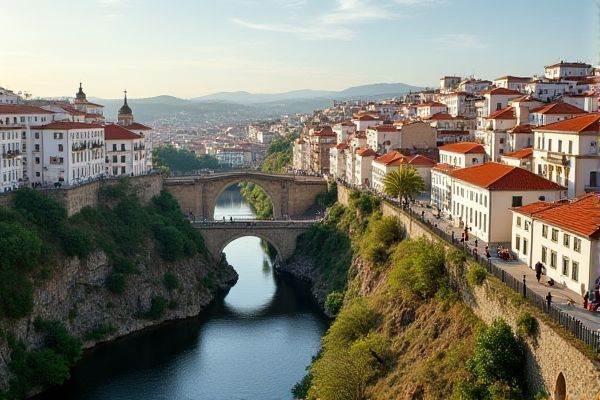
Education system and best schools in Portugal: Pre-school, basic, secondary, and higher education levels. Compulsory education from ages 6 to 18. National curriculum across public schools. Portuguese language primary mode of instruction. Private and public school options available. Externato Marista de Lisboa known for quality. Universidade de Lisboa among top universities. Porto's Escola Secundaria Infante D. Henrique renowned. International schools offer English curriculums. Vocational training available in secondary education.
Pre-school, basic, secondary, and higher education levels.
The education system in Portugal is regulated by the Ministry of Education and consists of four stages: pre-school education (ages 3-6), primary education (ages 6-15), secondary education (ages 15-18), and higher education (ages 18 and above). Public education is free from ages 6 to 18, providing accessibility to all children within this age range. In addition to public schooling, Private Education offers alternative curriculums, particularly catering to expatriate families seeking different educational paths within Portugal. International schools further enrich the options available, ensuring that every family can find a suitable educational environment for their children.
Compulsory education from ages 6 to 18.
In Portugal, compulsory education spans from the age of 6 to 18, covering primary education (Ensino Basico) from ages 6 to 15, followed by secondary education (Ensino Secundario) from 15 to 18. This educational framework is mandatory, and following the completion of secondary schooling, students have the option to advance to higher education or transition into the job market. For more information on the structure and details of the educational stages, visit the Education System in Portugal.
National curriculum across public schools.
The national curriculum in Portugal is consistent across all public schools, ensuring a standardized educational experience for all students. Subjects including Portuguese, Mathematics, Science, History, Geography, and English are mandatory for students aged 6 to 18. This comprehensive approach is designed to equip students with essential knowledge and skills. For more detailed information about the educational framework, one can visit the Expatica Education System in Portugal page, which offers an in-depth look at the structure and unique characteristics of the Portuguese educational system.
Portuguese language primary mode of instruction.
In Portugal, the education system is structured into four stages: preschool (ages 3-6), primary education (ages 6-15) divided into three cycles, secondary education (ages 15-18) with vocational or science-humanities streams, and higher education (ages 18 and above). Public schools are free and use Portuguese as the primary mode of instruction. These schools include mandatory subjects such as Portuguese, mathematics, science, and a foreign language, with English being a compulsory subject starting from primary school. For further details, you can visit the Portuguese Education System.
Private and public school options available.
In Portugal, the education system offers both free public schools and private institutions. Public schools, regulated by the Ministry of Education, provide free education from ages 6 to 18, while private and international schools, such as those following the International Baccalaureate or British curriculums, offer alternative options with varying tuition fees. These institutions often cater to expat families and provide multilingual education. For more detailed information about the Portuguese educational framework, you can visit the overview of The Education System in Portugal.
Externato Marista de Lisboa known for quality.
Externato Marista de Lisboa is known for its quality education, offering a comprehensive educational model from pre-school to secondary education, with a strong focus on sports and cultural activities. Its mission is to educate through these activities while providing academic support and excellence. For more information, you can visit the Externato Marista de Lisboa website.
Universidade de Lisboa among top universities.
The Universidade de Lisboa, created through the merger of the former Technical University of Lisbon and the University of Lisbon in 2013, stands proudly as one of the top universities in Portugal, ranked joint 305th globally. As the largest university in Portugal, it boasts over 47,000 students across 18 faculties. It is highly esteemed for its excellence in subjects such as art and design, mining engineering, and geography. For more insights into studying in Portugal, visit this comprehensive Guide to gain a deeper understanding of educational opportunities in the region.
Porto’s Escola Secundária Infante D. Henrique renowned.
Escola Secundaria Infanta D. Maria is renowned as the best public school in Portugal. This prestigious institution is located in Coimbra and boasts an impressive average student score of 13.12. It is important to clarify that there is no mention of a school named Escola Secundaria Infante D. Henrique in the provided sources. For more details about this exceptional educational establishment, you can visit their dedicated article on the Immigrant Invest blog.
International schools offer English curriculums.
In Portugal, international schools offer various English-based curriculums, including the British National Curriculum, American curriculum, and the International Baccalaureate (IB) Diploma, providing a range of educational options for students. Notable schools such as Nobel Algarve British International School, Oporto International School, and St. Peter's International School exemplify the high standard of education available. These schools cater to diverse learning needs and are an excellent choice for families seeking quality education in an international setting.
Vocational training available in secondary education.
In Portugal, vocational training is integrated into the secondary education system through professional schools (Escolas Profissionais) and vocational courses (Cursos Profissionais), offering practical skills and qualifications in fields like IT, design, hospitality, and healthcare. This structure allows students to enter the workforce or pursue further vocational training upon completion. For more detailed information about the structure and benefits of vocational training in Portugal, you can visit the Portuguese Education System website.
